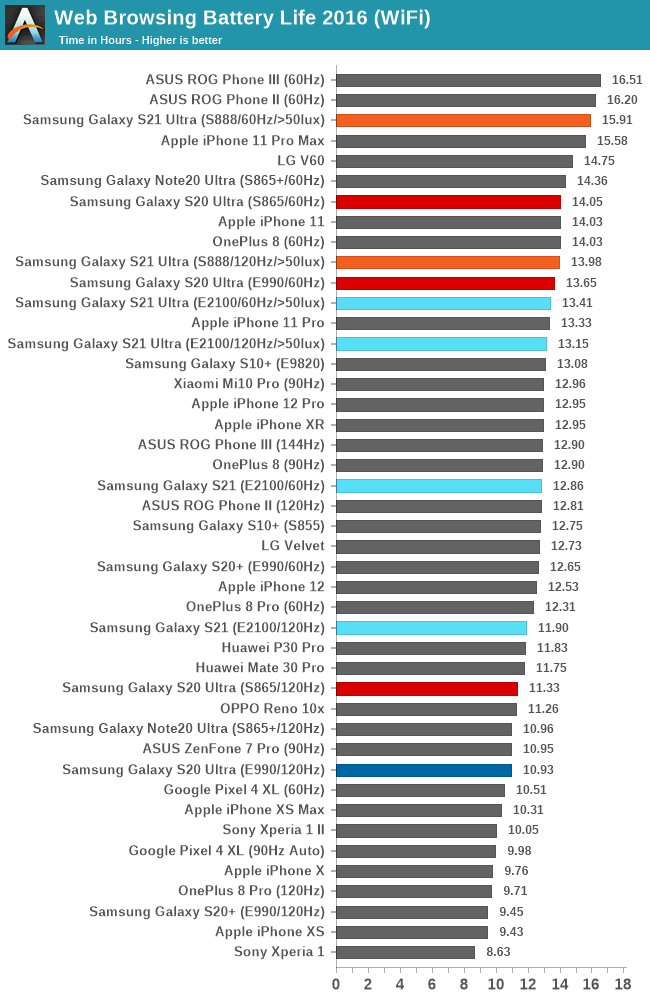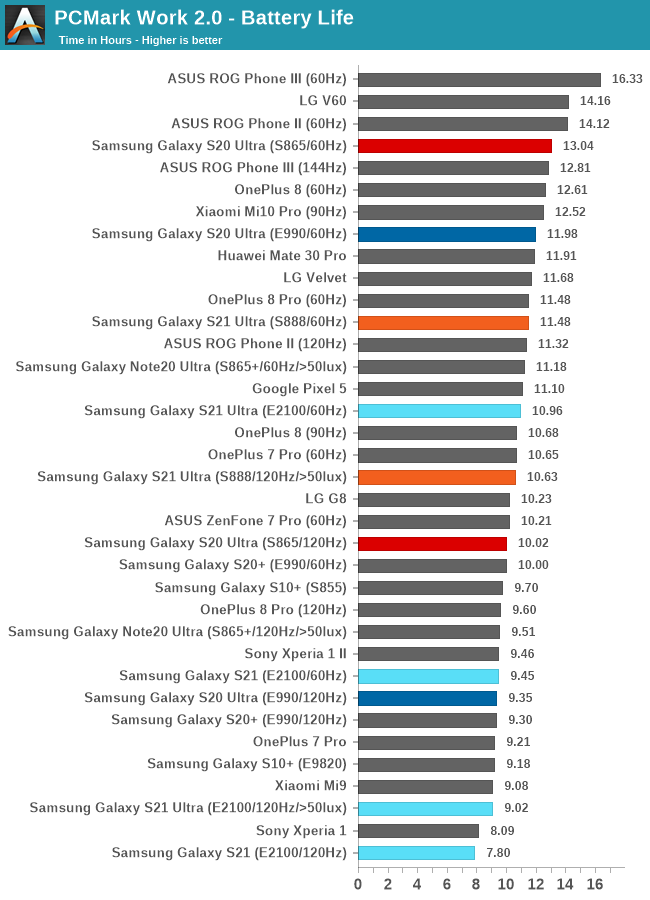The Samsung Galaxy S21 Ultra & S21 Review: The Near Perfect and The Different
by Andrei Frumusanu on February 22, 2021 12:00 PM EST- Posted in
- Smartphones
- Samsung
- Mobile
- Galaxy S21
- Galaxy S21 Ultra
Battery Life - Actually Great
Battery life of the S21 series is interesting as there’s two opposing factors that come into play. We’ve seen that this generation of SoCs are actually less energy efficient than last year’s iterations during interactive workloads. This comes at the benefit of higher performance, but generally it’s accurate that the new chips use more power. On the other hand, we also have more efficient displays, and high-refresh-rate operating modes.
On the Galaxy S21 Ultra, both software and hardware adaptive frequency work on a frame basis, allowing it the maximum power efficiency benefits even during 120Hz operation. Together with the much more luminance efficient screen, we should be looking at outstanding battery efficiency.
The regular S21 is more interesting as we hadn’t had the opportunity to see Samsung’s adaptive refresh mode on a display which doesn’t support hardware LFD. Here, the mode switching between 120Hz and 60Hz is on a coarser software level – the display will switch to 60Hz on static screens, but only after around a second of inactivity. That’s actually still great for power efficiency compared to the constant 120Hz of the S20 series, which means that in general every-day scroll-and-read behaviour, the 120Hz mode of the S21 and S21+ should still be much more efficient than their predecessors.

In our web-browsing test, the results here are slightly different to our provisional test results we had published a few weeks ago- notably on the 120Hz runs.
Nevertheless, the results for the S21 Ultra are outstanding. Even though in theory the SoC is more power hungry, the new display is so much more efficient, that we’re seeing the S21 Ultra takes a large lead of 13% at 60Hz for the Snapdragon variant. The generational differences for the Exynos variants here is much smaller due to how more much responsive and aggressive the new SoC is, which mostly counteracts the new luminosity efficiency of the screen.
In 120Hz mode, the new Ultra devices both take massive leaps over their predecessors- showcasing the new adaptive frequency and LFD mechanisms and how they make 120Hz viable in every-day usage.
Even the smaller S21, the software based adaptive refresh helps a lot as the shift from 60Hz to 120Hz now only costs around 8% in battery life, whereas last year on the S20+ it had a +25% impact.
People will notice the Snapdragon S21 Ultra has a larger delta between its 60 and 120Hz modes, and I think that’s because for some reason the Snapdragon 888 behaves much less aggressive in its 60Hz setting, while the Exynos S21 is tuned to be equally responsive regardless of refresh rate, which is a software discrepancy between the two phones.

Overall Battery Life: Great
In general, the S21 Ultra’s battery life is just fantastic thanks to the new generation display and its heightened power efficiency. The advantages here will vary depending on how you use it – if you tend to use it in dim environments at lower brightness, you might not see the improvements as much as if you’re in a bright scenario and tend to use your phone at high brightness levels. The brighter it will be, the better the S21 Ultra will fare. In super bright scenarios, the phone will be unmatched.
For the S21, and likely applicable to the S21+ as well, battery life is also great. While not as powerful as the Ultra’s adaptive refresh mechanisms, the new software-based implementation on the S21 means that 120Hz is also a very viable option this generation.
While we’re seeing battery life this generation still favour the Snapdragon chips, the Exynos this year isn’t all that far behind, and given the general user experience equality between the two phones, it’s not a major point of contention anymore.










122 Comments
View All Comments
theblitz707 - Wednesday, March 3, 2021 - link
I dont get when people say android lag. My s10+ never lag in daily usageprobedb - Tuesday, February 23, 2021 - link
Have the S21, previously the S20+. Far prefer the S21, flat screen...it's in a case so makes no difference. Screen res, well since the S20+ required you to go FHD to use 120Hz then it makes very little difference and I use it a lot every day. Fingerprint reader is waaaaaaaaay better, like orders of magnitude better. The S20+ was awful for the delay in recognising your print, much faster on the S21. The S21 just feels faster overall as well. Perfectly happy especially since Samsung did a very good trade-in on the S20+, plus selling the free tag and phones meant it cost very little overall.eastcoast_pete - Tuesday, February 23, 2021 - link
Thanks Andrei for the review. Just one fly in the "currently on sale in the US" for the S21 Ultra: yes, that's correct, but only the 128 GB storage version is on sale, the others are "out of stock". And, absent an option for expandable storage, I wouldn't buy a premium phone with less than 256 GB. Videos and photos eat storage.Andrei Frumusanu - Tuesday, February 23, 2021 - link
True for the 256GB, but the 512GB is also in stock at $1,179.99 which is less than the 128GB MSRP.pse - Tuesday, February 23, 2021 - link
Excellent review, as usual, Andrei. I was hoping to see a few video samples as well. I've found, by looking at other online samples, that there are significant differences in low light video processing between the SD888 and the Exynos 2100, I was wondering if you found similar results in your tests. Cheers!Andrei Frumusanu - Tuesday, February 23, 2021 - link
Frankly speaking any results right now are outdated as Samsung is pushing out firmware updates at a fast pace with the cameras behaving differently.We'll revisit everything in a few weeks/months.
The hard truth - Tuesday, February 23, 2021 - link
There's no talk about the video aspect of the camera in this review. Therefore this review is incomplete and poor.JoeDuarte - Tuesday, February 23, 2021 - link
Note that the actual price can be well below half of MSRP if you buy directly from Samsung and trade in an older phone.I'm paying $285 instead of $849 for the S21 256 GB model. I'm trading in a Galaxy S10E. I feel like the S21 is a steal for $285.
Also, Samsung is on Rakuten with 10% off, so I'm getting $28.50 back. So now we're down to $256.50.
I'm getting a "$100 Samsung credit" as well, but I haven't looked into that. I guess it's for the Samsung store? Maybe I can get some earbuds or something.
I posted a screenshot of the deal/order here: https://imgur.com/a/7iPWqw6
I'm not clear on their statement math, but the bottom line is that I got the phone for just over $250. (I think they assessed sales tax on the full list price of the phone though – I'm not sure if that's normal or locale-specific.)
ottonis - Tuesday, February 23, 2021 - link
First of all, many thanks for this huge test/review! Really very informative and useful information.However, is there test planned on the video capabilities of these phones?
flyingpants265 - Tuesday, February 23, 2021 - link
no headphone jack = no buy, it's an open and obvious conspiracy to make billions in revenue from crappy wireless headphones.no front speakers = no buy, I don't care if most people don't notice the difference, how the hell can you purposefully make subpar products for ~14 years straight? Front stereo speakers are obviously superior, you can listen to youtube in landscape mode or use a small kickstand, you can use the phone with a gamepad, and get full sound without having to mess with bluetooth, headphones, or the crappy sidefiring speaker which isn't even close, stop making excuses.
Also, all phones should be 100% rated for underwater use. Obviously the battery should be replaceable when it starts to degrade. Again, it doesn't benefit a manufacturer to make an indestructible phone. But it would be a great idea for any company with low market share.
Android royally sucks. We're ~14 years in or something now, SoCs have increased in power and have 12GB RAM, but they still can't do the very basics of what I could do with Windows 98SE or 2000, namely, have multiple windows open/loaded into RAM and switch between them instantly. Press alt-tab on your computer a few times and tell me how long that takes. Compare that to phone "app switching" and phone "keyboard lag". The OS and apps are poorly written, there is no excuse for that. Removing features, garbage obfuscated slow UI. Crap.
Of course this is just the beginning. Every single day, humanity just makes excuses for mediocrity and ends up getting screwed by billion-dollar companies. At least if I'm going to have a $1000 brainwashing/tracking device, I want it to be designed properly. And yes, I could do better on all accounts. There's a giant hole in the market for an... ACTUAL GOOD PHONE.